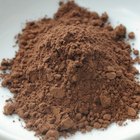
sfe-co2/iStock/Getty Images
Since its discovery over 2,000 years ago by ancient Meso-American cultures, chocolate has been cherished as a delicious and highly-prized delicacy. While chocolate is typically hailed as an unhealthy dessert, some types of chocolate are surprisingly nutritious. Chocolate is produced from small seeds called cacao bean seeds, which provide chocolate with a wide range of vitamins, minerals, antioxidants and other nutritional compounds.
Vitamin Content
Despite its reputation as an unhealthy indulgence, chocolate actually has a surprisingly rich nutritional content. It contains traces of several basic vitamins, including vitamins C, A, E and D. Chocolate also contains minerals iron, phosphorus and copper. Chocolate made with milk contains high-quality protein, potassium, magnesium and calcium.
Antioxidant Content
In addition to vitamins and minerals, chocolate can also serve as an excellent source of antioxidants. According to the Hershey Center for Health and Nutrition, when compared with other plants, cocoa beans have some of the highest concentrations of an antioxidant group called flavonols. The Hershey Center for Health and Nutrition reveals that a bar of dark chocolate contains even more antioxidants than other flavonol-rich foods, including blueberries, green tea and red wine.
Types
The three main types of chocolate are dark chocolate, milk chocolate and white chocolate. According to the Hershey Center for Nutrition and Health, while milk chocolate is the most popular type in the U.S., dark chocolate has the highest nutritional value. According to MayoClinic.com, the reason rests with dark chocolate’s high cocoa content. The average cocoa content of dark chocolate is 45 to 80 percent. Milk chocolate typically contains 5 to 7 percent while white chocolate contains none. White chocolate is therefore not considered a significant source of antioxidants.
Benefits
According to MayoClinic.com, the flavonols found in chocolate may help prevent cell damage from free radicals, which are thought to be a risk factor in heart disease. According to the Hershey Center for Health and Nutrition, studies show that eating dark chocolate may help reduce high cholesterol and blood pressure levels, and increase blood flow to your heart and arteries. Eating chocolate may also help improve your cognitive function. According to the Hershey Center for Health and Nutrition, the cocoa content in chocolate may help to improve your mood and sharpen your mental focus by boosting your brain’s supply of serotonin and endorphins, and by increasing the amount of oxygen and blood flow to your brain.
Warning
Even though chocolate does have some nutritional merit, you should still consume chocolate in moderation. According to MayoClinic.com, many commercial chocolate products contain significant amounts of sugar, fat and added calories that may be a concern if you are watching your weight. Chocolate also contains high levels of caffeine. According to the Hershey Center for Health and Nutrition, chocolate can contain anywhere between 25mg and 40mg of caffeine. To get the most benefits out of chocolate, MayoClinic.com recommends eating a maximum of three ounces of chocolate per day.
Related Articles

Bad Effects of Chocolate

Stimulants in Chocolate That Are not ...

Vitamins for Mental Alertness

Caffeine in Chocolate Versus Coffee

Which Country Produces the Most ...

Nutrition: Fruit and Vegetable Colors

Types of Healthy Dark Chocolate

Number of Calories in Dark ...

What Are the Benefits of Chocolate ...

How Does Chocolate Affect the Nervous ...

Nutrition Information on Blueberries

Skin Benefits of Eating Coconut Oil

Foods Containing Theobromine

Nutritional Facts of Pure Cocoa

Hershey's Special Dark Miniatures ...

Cappuccino Nutrition Information

The Best Brands of Chocolate to Eat For ...

What Vitamin Are You Missing If You ...

Nutrition in Carob Vs. Chocolate

Why Are Fruits Important?
References
Resources
Writer Bio
Tamara Moffett is a freelance copywriter with a bachelor's degree in English and over seven years of experience. She specializes in writing persuasive sales copy, news stories and feature articles for magazines. Her work has appeared online and in the pages of publications like "Green Business Quarterly," "Black Ink Magazine" and the "Daily Journal of Commerce."
Photo Credits
sfe-co2/iStock/Getty Images